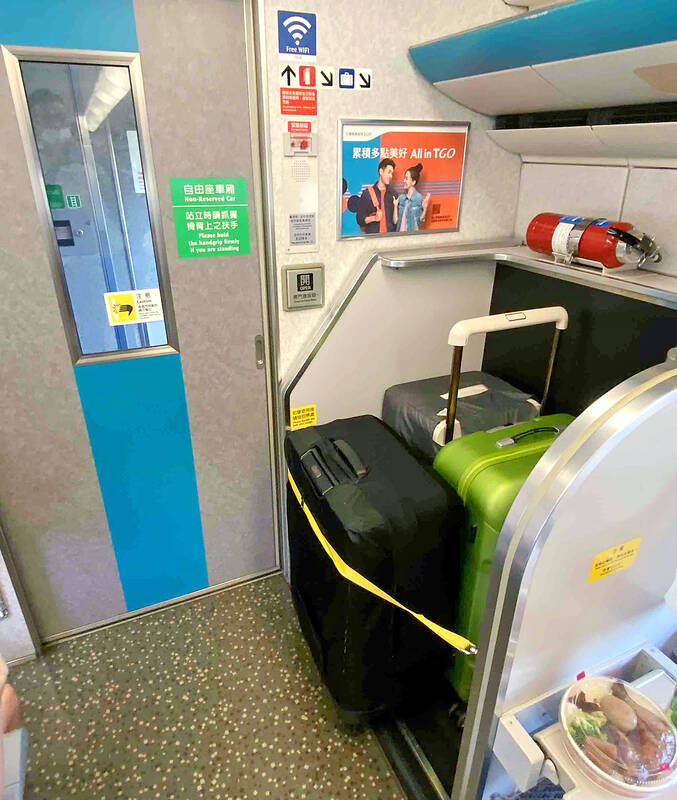Next-generation bullet trains with more space for luggage storage have been ordered from Japanese manufacturer Hitachi Toshiba Supreme Consortium and would arrive in the coming years, Taiwan High Speed Rail Corp (THSRC) officials said on Saturday.
The increasing number of people traveling abroad have resulted in crowded conditions on the nation’s high-speed rail (HSR), and many regular commuters have complained, the officials said.
More travellers going abroad means more space on the nation’s HSR being taken up by luggage, creating a need for more capacity to meet the demand, they added.

Photo: Huang Hsu-lei, Taipei Times
Data from the Tourism Administration showed that 8.28 million people traveled abroad by air from January to June this year, an increase of 68 percent from the same period last year.
Taichung Station, the rail line’s mid-point, is well known for being extremely crowded during peak hours due to passengers with large luggage filling up the rack and storage areas, the officials said.
A traveler surnamed Chang (張) said she often takes trips to Japan from Taiwan Taoyuan International Airport, traveling in business class on the HSR to get to the airport.
“Although I have a business class seat that is slightly larger than the standard class seat, there is not enough space to fit my luggage at my feet,” she said.
“However, when I get on the train, the luggage storage and racks are usually fully occupied, so it is quite a problem,” she added.
Another traveler surnamed Liu (劉), who usually gets on at Chiayi Station en route to Taoyuan Station, said he often has to stand as there is no room to put his luggage in front of his seat.
THSRC officials said that 34 trains were refurbished in 2021 to add space for luggage, bringing the total number of storage spaces in each train from 45 to 61.
The next-generation high-speed trains would have even more space, they added.
If the luggage racks are filled up, or luggage is blocking walkways or passenger seats, people can notify train service staff who can help make more space, the officials said.
More patrols would also be conducted to ensure walkways are not blocked, they said.

An undersea cable to Penghu County has been severed, the Ministry of Digital Affairs said today, with a Chinese-funded ship suspected of being responsible. It comes just a month after a Chinese ship was suspected of severing an undersea cable north of Keelung Harbor. The National Communications and Cyber Security Center received a report at 3:03am today from Chunghwa Telecom that the No. 3 cable from Taiwan to Penghu was severed 14.7km off the coast of Tainan, the Ministry of Digital Affairs said. The Coast Guard Administration (CGA) upon receiving a report from Chunghwa Telecom began to monitor the Togolese-flagged Hong Tai (宏泰)

A cat named Mikan (蜜柑) has brought in revenue of more than NT$10 million (US$305,390) for the Kaohsiung MRT last year. Mikan, born on April 4, 2020, was a stray cat before being adopted by personnel of Kaohsiung MRT’s Ciaotou Sugar Refinery Station. Mikan was named after a Japanese term for mandarin orange due to his color and because he looks like an orange when curled up. He was named “station master” of Ciaotou Sugar Refinery Station in September 2020, and has since become famous. With Kaohsiung MRT’s branding, along with the release of a set of cultural and creative products, station master Mikan

RISING TOURISM: A survey showed that tourist visits increased by 35 percent last year, while newly created attractions contributed almost half of the growth Changhua County’s Lukang Old Street (鹿港老街) and its surrounding historical area clinched first place among Taiwan’s most successful tourist attractions last year, while no location in eastern Taiwan achieved a spot in the top 20 list, the Tourism Administration said. The listing was created by the Tourism Administration’s Forward-looking Tourism Policy Research office. Last year, the Lukang Old Street and its surrounding area had 17.3 million visitors, more than the 16 million visitors for the Wenhua Road Night Market (文化路夜市) in Chiayi City and 14.5 million visitors at Tainan’s Anping (安平) historical area, it said. The Taipei 101 skyscraper and its environs —

Taiwan on Friday said a New Zealand hamburger restaurant has apologized for a racist remark to a Taiwanese customer after reports that it had first apologized to China sparked outrage in Taiwan. An image posted on Threads by a Taiwanese who ate at Fergburger in Queenstown showed that their receipt dated Sunday last week included the words “Ching Chang,” a racial slur. The Chinese Consulate-General in Christchurch in a statement on Thursday said it had received and accepted an apology from the restaurant over the incident. The comment triggered an online furor among Taiwanese who saw it as an insult to the